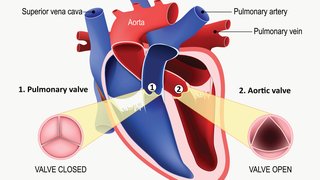Pregnancy can predict future heart health: Tips to shape your destiny
February 28, 2025

Ever wish you could look into a crystal ball and see what your future holds? Well, it turns out that pregnancy can act as a window into your future heart health.
Pregnancy acts as a stress test for the heart, which works exceptionally hard to grow the baby. Your heart needs to pump up to 50% more blood during that time! Then comes labor, delivery, and the postpartum period.
While many women’s hearts deal with this additional stress just fine, in others, pregnancy can reveal undiagnosed heart conditions or trigger them. This can result in complications of pregnancy, and substantial research shows that certain pregnancy complications – such as preeclampsia and preterm birth – are associated with cardiovascular complications later in life.
Having a complex pregnancy doesn’t mean your cardiovascular destiny is set in stone. But it is an opportunity for you and your health care provider to identify and manage the heart disease risk factors that are within your control.
UT Southwestern Ob/Gyns work closely with cardio-obstetrics specialists and maternal-fetal medicine doctors to help detect potential concerns as early as possible in pregnancy. The sooner we can spot and manage cardiovascular challenges, the better your chances of a heart-healthy future – today and in the years to come.
Ultimately, we want to help you to be not only a healthy mom but also a healthy grandma when the time comes!
Pregnancy challenges that can affect the heart
Most women go through pregnancy with no notable problems. But about 8% of pregnant women have complications, ranging from mild to severe. Understanding which of these can affect future heart health gives you an action plan to prevent or minimize future cardiovascular disease.
1. High blood pressure
Also called gestational hypertension, this is when blood pressure readings are 140/90 mmHg or higher after 20 weeks of pregnancy in a woman with previously normal blood pressure (120/80 mmHg or lower). Women who have complications with gestational hypertension have a 63% increased risk for developing future cardiovascular disease.
2. Preeclampsia
Preeclampsia is a type of high blood pressure that also includes signs of damage to the liver, kidneys, or other vital organs. This serious condition affects 5%-8% of pregnancies in the U.S. Women who have preeclampsia are twice as likely to develop heart disease or have a stroke and four times as likely to have hypertension than those who don’t have preeclampsia. Of every three women who have preeclampsia, two will die from cardiovascular disease later in life. Recent data has also started to show a link between preeclampsia and a future risk for vascular dementia.
3. Gestational diabetes
Up to 9% of women develop diabetes during pregnancy, known as gestational diabetes. Along with the associated 50% odds of developing Type 2 diabetes later in life, it brings a 68% higher risk of future heart disease.
4. Excessive weight gain during pregnancy
It’s long been known that obesity can increase a person’s risk of heart disease. But excessive weight gain during pregnancy also can increase your risk. Research shows that women who had a normal weight before pregnancy but gained too much during pregnancy have a 20% increased risk of heart disease-related death.
5. Preterm delivery
One in every 10 infants in the U.S. is born before 37 weeks of pregnancy. Studies [MT5] have shown that having a preterm delivery doubles a woman’s risk of developing cardiovascular disease later in life. Individually, there are different reasons why someone may have a preterm delivery, so the risk for someone who delivered preterm due to preeclampsia or fetal growth restriction or placental abruption is more impactful than, for example, someone who delivered slightly early due to preterm labor with twins and no other complications.
6. Placental abruption
This severe pregnancy complication refers to the separation of the placenta from the uterus before birth. Women with placental abruption face about double the risk of having future heart disease or a stroke compared to women with normal pregnancies.
7. Pregnancy loss
Sadly, miscarriage or early pregnancy loss affects 10%-20% of identified pregnancies. The actual loss rate of very early, unrecognized pregnancies is higher. Women with a history of three or more recognized pregnancy losses are twice as likely to develop later heart disease. The future association would be lower in someone who knows that the losses were related to a chromosome anomaly in that pregnancy, but this is often not known.
8. Twin pregnancy
Women pregnant with two or more babies are more likely to have complications during pregnancy that can continue to have an impact afterward. Data published in February 2025 in the European Heart Journal showed that women who gave birth to twins are twice as likely to be readmitted to the hospital for heart disease within a year compared to those who had only one baby.
All these associations above are complex, and research is often limited in its ability to derive true cause and effect. For example, with the twin association, the risk would be higher for a woman who was 40 and also had obesity, type 2 diabetes, chronic hypertension, and twins conceived with the assistance of reproductive technology (which has a higher association with multiple gestation) than for an otherwise healthy 22-year-old who had twins.
Essential 8: Transform your future heart health
Having one or more of these pregnancy complications doesn’t necessarily mean you are destined for future heart problems. In fact, a 2024 study showed that women who had pregnancy complications and achieved or maintained good heart health after had a similar risk of heart disease as women without no pregnancy or heart concerns. The key is taking charge of those aspects under your control.
Life's Essential 8
To help optimize and manage your heart health, follow the American Heart Association’s recommendations known as Life’s Essential 8:
Eat a healthy diet: Strive for whole foods, including fruits, vegetables, lean protein, nuts, and seeds.
Be more active: Get two and a half hours of moderate exercise or 75 minutes of vigorous physical activity per week.
Quit tobacco: This includes traditional cigarettes, e-cigarettes, smokeless tobacco products, and vaping.
Get healthy sleep: Most adults need seven to nine hours of sleep each night. Practice good sleep hygiene, such as going to sleep and waking on a schedule and limiting screen time before bed.
Manage weight: Take with your health care provider about what is a healthy weight for you before, during, and after pregnancy.
Control cholesterol: High levels of non-HDL or “bad” cholesterol can lead to heart disease. Along with diet changes, there are many medications that are safe to take while pregnant or breastfeeding.
Manage blood sugar: Undiagnosed or uncontrolled diabetes can damage many parts of the body, including the heart, eyes, and kidneys. Medication, exercise, and diet changes are key to blood sugar management.
Manage blood pressure: A blood pressure reading of less than 120/80 mmHg is optimal. Diet changes and medication can help curb the associated risks.
Take control of your future health
If you develop a complication during pregnancy that could indicate a future risk of heart disease, discuss it with your primary care provider. They can help you develop heart-healthy habits and more closely monitor your heart health going forward.
Past complications may not prevent you from having another baby. Talk with your provider about how to optimize your health and steps to take before or during a future pregnancy. They may suggest changes to your daily routine and medications to avoid, such as antihypertensive medications in the ACE-Inhibitor (usually end in “-pril”) or ARB class (usually end in “-sartan”). Making a preconception optimization plan is essential in minimizing risk.

In some cases, such as with heart failure or significant structural or valve disorders, it may not be recommended to carry another baby. Talk with your doctor about whether you shouldn’t get pregnant again – this is not the same thing as “can’t” get pregnant, and birth control discussions are key to preventing pregnancy when it is a danger. The difference could be life changing. We can also talk with you about ways to build your family that do not involve carrying a baby in your own uterus.
If you do not want to or have been counseled that you should not become pregnant again, talk with your doctor about the best birth control options for your condition. For example, the combination birth control pill may not be a good choice for a woman who has a history of a blood clot or who should not get pregnant for her own health – it may be too easy to miss a pill and become pregnant unexpectedly. The good news is we have many options and can work with you to individualize this decision.
Many pregnancy complications can be managed with support from an expert health care team, and some can provide a glimpse into your future heart health. Working with your doctor, you can use this information to build a healthier future for yourself and your family.
Related reading:
Getting to the heart of your pregnancy: What cardiovascular changes you can expect
Navigating pregnancy with a heart condition: What you need to know
To make an appointment about how pregnancy complications can affect your heart health, call 214-645-3838 or request an appointment online.











